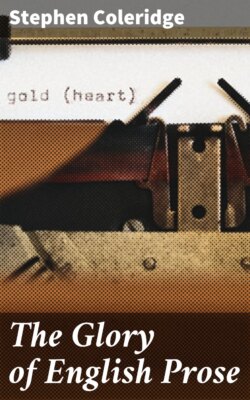Читать книгу The Glory of English Prose - Stephen Coleridge - Страница 11
На сайте Литреса книга снята с продажи.
7
ОглавлениеTable of Contents
My Dear Antony,
You will have seen from the extracts I have already quoted to you of the writers of the Elizabethan age that the style of all of them possesses something large and resonant, something that may be said to constitute the "grand style" in prose; and this quite naturally without effort, and without the slightest touch of affectation.
A great writer who came immediately after the Elizabethans—namely, Sir Thomas Browne, who lived from 1605 to 1682—displays the development in his style of something less simple and more precious than ruled in the former generation.
It is difficult to select any passage from his works where all is so good. He was curious and exact in his choice of words and commanded a wide vocabulary. There is deliberate ingenuity in the framing of his sentences, which arrests attention and markedly distinguishes his style. His Urn Burial, in spite of its elaboration, reaches a grave and solemn splendour.
The fifth chapter, which begins by speaking of the dead who have "quietly rested under the drums and tramplings of three conquests," rises to a very noble elevation as English prose.
Here I quote one paragraph of it, characteristic of the whole:—
"Darkness and light divide the course of time, and oblivion shares with memory a great part even of our living beings; we slightly remember our felicities, and the smartest strokes of affliction leave but short smart upon us. Sense endureth no extremities, and sorrows destroy us or themselves. To weep into stones are fables. Afflictions induce callosities; miseries are slippery, or fall like snow upon us, which notwithstanding is no unhappy stupidity. To be ignorant of evils to come, and forgetful of evils past, is a merciful provision in nature, whereby we digest the mixture of our few and evil days, and, our delivered senses not relapsing into cutting remembrances, our sorrows are not kept raw by the edge of repetitions. A great part of antiquity contented their hopes of subsistency with a transmigration of their souls—a good way to continue their memories, while having the advantage of plural successions they could not but act something remarkable in such variety of beings, and, enjoying the fame of their passed selves, make accumulation of glory unto their last durations. Others, rather than be lost in the uncomfortable night of nothing, were content to recede into the common being, and make one particle of the public soul of all things, which was no more than to return into their unknown and divine original again. Egyptian ingenuity was more unsatisfied, contriving their bodies in sweet consistencies, to attend the return of their souls. But all was vanity, feeding the wind, and folly. The Egyptian mummies, which Cambyses or Time hath spared, avarice now consumeth. Mummy is become merchandise. Mizraim cures wounds, and Pharaoh is sold for balsams."
Milton was a contemporary of Sir Thomas Browne, and, like all great poets, was a master of resounding prose. All that he wrote, both in verse and prose, is severely classic in its form. His Samson Agonistes is perhaps the finest example of a play written in English after the manner of the Greek dramas.
Milton wrote The Areopagitica in defence of the liberty of publishers and printers of books. And it stands for all time as the first and greatest argument against interference with the freedom of the press.
The Areopagitæ were judges at Athens in its more flourishing time, who sat on Mars Hill and made decrees and passed sentences which were delivered in public and commanded universal respect.
I will quote one of the finest passages in this great and splendid utterance:—
